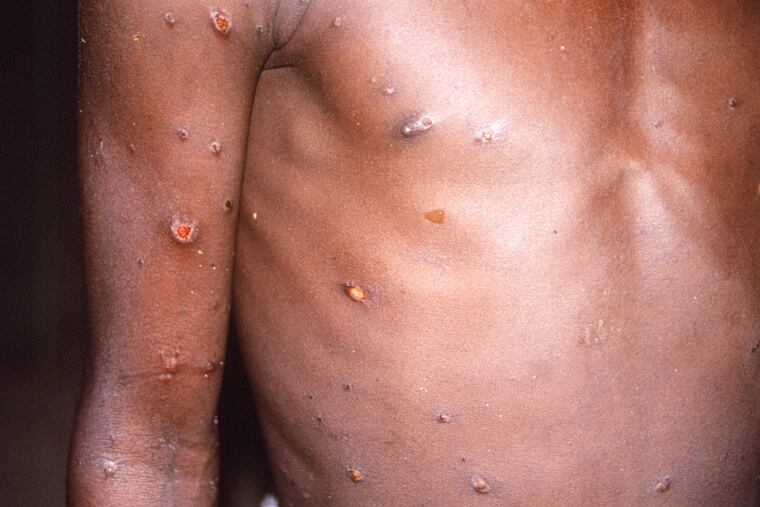Monkeypox case identified in Philadelphia, likely first in the state
The Philadelphia case is the 19th in the U.S.

A Philadelphia resident likely has monkeypox, bringing the national total of such cases to 19, city health officials said Thursday afternoon.
The city Department of Public Health said it was not revealing any details about the person in order to protect their privacy but said officials will notify any of the patient’s close contacts who may have been exposed.
“The threat to Philadelphians from monkeypox is extremely low,” said Dana Perella, manager of the agency’s acute communicable disease program. “Monkeypox is much less contagious than COVID-19 and is containable, particularly when prompt care is sought for symptoms.”
The 19 people all were infected with a virus from a broader category called orthopox viruses, as identified through testing at local or state laboratories. All such cases are presumed to be monkeypox, given the recent spread of that virus, but some (including the Philadelphia case) have not yet been confirmed as monkeypox through additional tests at the CDC.
» READ MORE: Why monkeypox is almost nothing like COVID
The rising case numbers come as health officials continue to respond to a COVID-19 pandemic now in its third summer, with ongoing scrutiny into their response to the novel coronavirus. Monkeypox, however, is not new. That virus infects thousands of people every year in Africa, but its spread outside that continent this year is highly unusual — with the first such case confirmed in England on May 6. Since then, several hundred cases have been identified in 29 countries where the virus does not normally circulate.
There are no mutations in the virus that might explain why it is circulating outside Africa, physicians said Wednesday during an Infectious Diseases Society of America news briefing.
Monkeypox spreads primarily through close skin-to-skin contact. Some of the early cases elsewhere were identified among men who have sex with men, but there is no evidence the virus spreads any more readily in that group than in others, the physicians said.
Symptoms typically begin with fever, intense headache, and swelling of the lymph nodes, followed by skin lesions within one to three days.
The illness can last two to four weeks. It can be fatal, but the death rate varies widely from strain to strain, from near zero to as high as 11%, according to the World Health Organization. Just one death has been reported from this outbreak, outside the United States.
Individuals experiencing an “unexplained rash on their face, palms, arms, legs, genitals or perianal region” should contact their health provider as soon as possible, a news release from the city health department said. People who feel sick should stay home.
A vaccine against monkeypox already is available, as it’s the same one used against smallpox, a closely related virus. But physicians say widespread vaccination is unlikely to be recommended, given the limited spread of the monkeypox virus.
Instead, health officials typically vaccinate high-risk contacts of those who have been infected. Antiviral treatments also are available. No one should curtail usual activities on account of this virus, Perella said.
“I believe that residents and visitors should feel safe to do all the fun things Philadelphia has to offer, with the proper precautions,” she said.